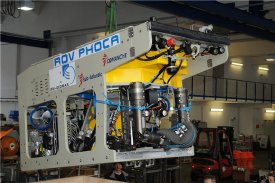Jan 16 2011
The deep sea covers a significant part of the Earths’ surface but it’s as hostile and inaccessible for humans as the outer space. Scientists have to use submersibles or robots to explore the unknown depths of the oceans. So far, the Leibniz Institute of Marine Sciences (IFM-GEOMAR) in Kiel, Germany, has operated the autonomous underwater vehicle ABYSS, the submersible JAGO and the remotely operated vehicle ROV KIEL 6000.
Now, the new medium-sized ROV PHOCA substantially expands the deep sea research capacities of the IFM-GEOMAR. Its primary purpose will be to install and maintain the new deep sea observatory MoLab.
 The new ROV PHOCA at the IFM-GEOMAR. photo: A. Villwock, IFM-GEOMAR
The new ROV PHOCA at the IFM-GEOMAR. photo: A. Villwock, IFM-GEOMAR
It was a huge parcel which was delivered to the Leibniz Institute of Marine Sciences in Kiel (IFM-GEOMAR) by a truck just before Christmas 2010. Even though it was not a Christmas present, it had been eagerly waited for by the technical and scientific staff of the institute. The plain wooden box contained, carefully wrapped, PHOCA, a brand new deep sea ROV. PHOCA will be used in the future to install complex deep sea observatories.
“It’s like having grown new arms and eyes for investigating the deep sea”, Dr Olaf Pfannkuche, scientific head of the Technology and Logistics Centre of the IFM-GEOMAR, remarked.
ROV PHOCA is a medium sized work class ROV of the type “Comanche” manufactured by the Scottish company “sub-Atlantic”. Its weight is 1.5 tons and its operational working depth is 3000 m. Together with ROV KIEL 6000, which has been in operation at the IFM-GEOMAR since 2007, the institute now owns two remotely operated vehicles with so-called work class capabilities. For the experienced ROV team of the IFM-GEOMAR, several components on the new ROV are well known. “We decided for this special type of ROV for compatibility reasons, and thus synergetic effects”, explains Dr Friedrich Abegg, head of the ROV team. For example, the two winches and umbilicals of both ROVs are interchangeable. Similarly, the two manipulators of PHOCA are of the same type as one of KIEL 6000 manipulators, thus minimizing training time regarding operation and maintenance. Another great advantage of ROV PHOCA is its less extensive infrastructure, allowing deployment off the smaller institute-owned research vessels like RV POSEIDON or RV ALKOR, thus filling a gap in the respective portfolio of the institute.
The ROV, the costs of which in combination with its control cabin, winch and cable sum up to a total of about 1.2 Mio. Euro, will at first be primarily used for installation and maintenance of the modular multidisciplinary underwater observatory MoLab. This novel monitoring system for the deep sea is momentarily developed at the IFM-GEOMAR and is partly manufactured by companies based in Schleswig-Holstein.
“Two thirds of the earth’s surface are basically unknown to us as they are covered by oceans with depths of several kilometres”, Dr Olaf Pfannkuche, also coordinator of the MoLab project, explains. “If we want to understand the functioning of the earth, we need to monitor these two thirds more intensely and on a long-term time scale. MoLab is an important step into this direction”, Dr Pfannkuche emphasises. The ROV PHOCA will be an essential assistant in this context, being able to install, rebuild as well as maintain scientific equipment at the sea floor. First sea trials for MoLab and the new ROV are expected to take place in spring 2011.
"We are very happy about this accession” IFM-GEOMAR director Professor Peter Herzig emphasises. „With these new capacities which PHOCA offers, we will be able to fulfil our scientific duty far more flexible than before. The technical equipment of the IFM-GEOMAR especially regarding large instruments designated for deep-sea deployment is one of the most modern in Europe.”